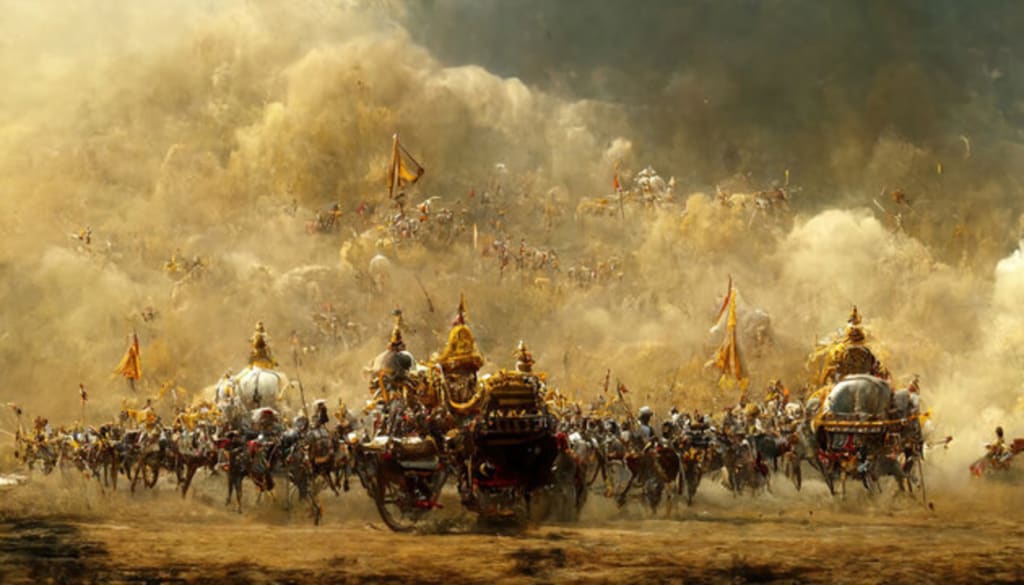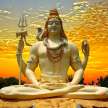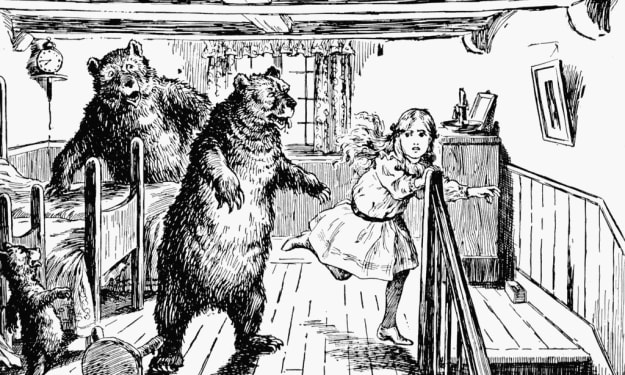
One of the two principal Sanskrit epics of ancient India is the Mahabharata; the other is the Ramayana. The Kurukshetra War and the princes Kaurava and Pandava's fates are described in this epic poem. The sage Vyasa, who plays a significant role in the epic, is often credited with writing the Mahabharata.
The Mahabharata is a long and intricate epic with many subplots, religious and philosophical discussions, and lessons. This is a shortened synopsis of its primary plot:
Background: King Bharata, after whom India is named Bharatavarsha, is the ancestor of the Kuru dynasty, which is told at the beginning of the Mahabharata. The Pandavas and the Kauravas are the two groups that make up the Kuru kingdom. The Kauravas are the hundred sons of King Dhritarashtra, the blind king, born to his wife Gandhari, whereas the Pandavas are the five sons of King Pandu, born to his two wives Kunti and Madri.
The Pandavas and Kauravas: The Kauravas' resentment of the Pandavas, particularly their eldest brother Yudhishthira, who is a good ruler, is the source of the growing animosity between the two groups. In the legendary dice game when Yudhishthira gambles away his country, the Kauravas plot to deprive the Pandavas of their kingdom,fortune, as well as his spouse Draupadi and brothers. The Pandavas are consequently banished for a total of twelve years, with an additional year spent in secret.
Exile and Return: The Pandavas experience a number of hardships while they are exiled. They spend most of their time in the woodlands, where they come into angels, devils, and sages. They also obtain heavenly armaments and allies like Lord Krishna. They return to their country after their exile is over, but the Kauravas won't give it back, which sets up the inevitable Kurukshetra War.
The Mahabharata revolves around the Kurukshetra War, which is its principal event. Over the course of its eighteen days, there is a great deal of loss and bloodshed on both sides. In the end, the Pandavas triumph. However, the conflict takes a terrible toll; the majority of their kin and allies—including well-known fighters like Bhishma, Drona, Karna, and Duryodhana—die.
Aftermath: Yudhishthira ascends to the throne of Hastinapura as a result of the conflict, but he is tormented with grief and guilt over the lives lost. In the end, the Pandavas give up their empire and travel to the Himalayas with their wife Draupadi and a dog that stands in for the god Dharma. Along the way, Draupadi and the Pandavas perish one by one till Yudhishthira is the only one left. At last, the god Indra puts him to the test, disclosing that the whole voyage was intended to measure Yudhishthira's moral rectitude. Ultimately, the Pandavas and Draupadi reach heaven and find salvation.
One of the most significant works of Hindu literature and culture, the Mahabharata explores a wide range of philosophical and moral issues in addition to telling a suspenseful story of battle and intrigue.
The Mahabharata, an Indian epic, revolves around the Kurukshetra War. The Pandavas and the Kauravas are two cousin groups engaged in a titanic battle for the legitimate heir to the Hastinapura throne.
An outline of the Kurukshetra War is as follows:
Background: A long-standing family quarrel is the root of the battle between the Pandavas and the Kauravas. The Pandavas, who are their cousins, are unfairly usurped from the realm by the Kauravas, commanded by their eldest brother Duryodhana. War is inevitable since the Kauravas refuse to give the Pandavas back their realm despite multiple attempts at peacemaking.
Both sides assemble allies, establish coalitions, and put a lot of effort into getting ready for battle. Lord Krishna, who also acts as their advisor and charioteer, is one of the many monarchs and warriors that support the Pandavas. In contrast, the Kauravas have a greater force, but because of their unfair deeds, they have lost their moral integrity.
Strategic Talks: Prior to the start of the conflict, the two sides engage in a number of diplomatic initiatives and strategic talks, including an effort to prevent casualties. But these attempts are unsuccessful, and conflict is unavoidable.
Start of the conflict: The conflict takes place on the battlefield of Kurukshetra, which is situated in the Indian state of Haryana today. Facing one other, the two armies are prepared for combat. Duryodhana leads the Kauravas, while Yudhishthira, the eldest brother, leads the Pandavas. Both sides uphold rigorous codes of honor and conduct during the conflict, which is conducted in accordance with the rules of warfare.
Important fights and Heroes: During the course of the eighteen days of combat, there are a number of epic fights as well as solitary dueling involving legendary warriors on both sides. Arjuna, Bhima, Drona, Karna, Bhishma, and other important characters in the conflict each shown incredible bravery and combat prowess.
Divine Intervention: The gods and other celestial creatures actively take part in the conflict, occasionally choosing sides and swaying the result of fights. Arjuna receives important guidance and wisdom from Lord Krishna, who drives his charioteer, including the lessons found in the Bhagavad Gita, a philosophical treatise on duty and righteousness.
Tragic Conclusion: Both sides suffer great losses and destruction as a result of the war. On the battlefield, several legendary fighters—Bhishma, Drona, and Karna, among others—die. In the end, the Pandavas triumph, but it is a heavy price to pay—many close friends and family members are among the many lives lost.
Aftermath: Yudhishthira ascends to the throne of Hastinapura as a result of the conflict, but he is troubled by the moral ramifications of it as well as the pain it inflicted. The Pandavas' eventual trek towards salvation and their resignation of the kingdom are among the events that are recounted in the Mahabharata.
In addition to being a story of warfare, the Kurukshetra War offers a wealth of insights into important subjects like responsibility, morality, justice, and the nature of humanity.






Comments
There are no comments for this story
Be the first to respond and start the conversation.